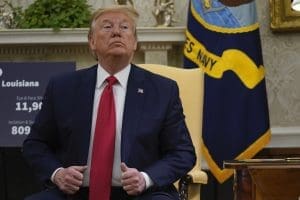Fact-checking Trump: No, US not testing 'more than every country in the world, combined'
In addition, on a more telling measure — the proportion of a country’s population that gets tested — the U.S. was not only late getting started but is still way behind.

Donald Trump was displeased when the Republican and Democratic leaders of Congress joined in a statement declining to use coronavirus testing machines from the White House for lawmakers. The statement affirmed what U.S. officials already know but Trump won’t admit — the U.S. is still short of the tests crucial to ending the pandemic.
Trump responded to their statement with a falsehood.
TRUMP: “Interesting? By Congress not wanting the special 5 minute testing apparatus, they are saying that they are not ‘essential’. In any event, we have great testing capacity, and have performed 6.5 million tests, which is more than every country in the world, combined!” — tweet Monday.
THE FACTS: This is not remotely true.
The U.S. has tested far fewer people than all other countries combined. It also lags dozens of countries in testing its population proportionally.
Together, just three countries — Russia, Germany, and Italy — have tested about 9.4 million people, compared with about 7.2 million in the United States, by the latest count. The next six countries in the ranking have each tested more than 1 million. And the count does not include China, the world’s most populous country and the one where the virus started, because it has not reported national numbers.
In their weekend statement, House Speaker Nancy Pelosi and Senate Majority Leader Mitch McConnell together thanked Trump for offering to send over rapid-test machines from the White House but “respectfully” declined.
“Our country’s testing capacities are continuing to scale up nationwide and Congress wants to keep directing resources to the front-line facilities where they can do the most good the most quickly,” they said. The polite pushback underscored the persistent U.S. failure to make diagnostic testing available in sufficient numbers, a shortfall also experienced on Capitol Hill.
The Senate convened Monday for the first time since March while the House held off.
Trump relentlessly boasts about U.S. testing in the face of its striking shortcomings. “We have an incredible testing,” he said Sunday in a Fox News interview. “We have the best testing system, right now, in the world.”
The total number of tests performed country to country is a poor measure of success because populations obviously differ hugely. On a more telling measure — the proportion of a country’s population that gets tested — the U.S. was not only late getting started but is still way behind.
More than 40 other countries have tested a greater proportion of their populations than has the United States. Some are geographically compact, making people easier to reach, but the world’s two largest countries by area, Russia and Canada, are among those that have outperformed the U.S.
So have Germany, Spain, Italy, Australia, and dozens more. China remains a question mark. The U.S now has surpassed South Korea in proportional as well as total testing. Trump specifically bragged about his country doing better than South Korea in testing people before that was so.
Recommended

Ohio doctors fear effects of emergency abortion care case set to go before U.S. Supreme Court
A federal law that allows emergency departments to treat patients without regard to their ability to pay will be under U.S. Supreme Court scrutiny this week, and Ohio doctors are concerned about the case’s local impact on emergency abortion care.
By Susan Tebben, Ohio Capital Journal - April 23, 2024
House GOP votes to end flu, whooping cough vaccine rules for foster and adoptive families
A bill to eliminate flu and whooping cough vaccine requirements for adoptive and foster families caring for babies and medically fragile kids is heading to the governor’s desk.
By Anita Wadhwani, Tennessee Lookout - March 26, 2024
U.S. House Speaker Johnson says IVF should be protected — just not by Congress
U.S. House Speaker Mike Johnson said Thursday that it’s up to states and not Congress to preserve access to in vitro fertilization, weighing in on a growing national debate and campaign issue.
By Jennifer Shutt, States Newsroom - March 14, 2024








































































